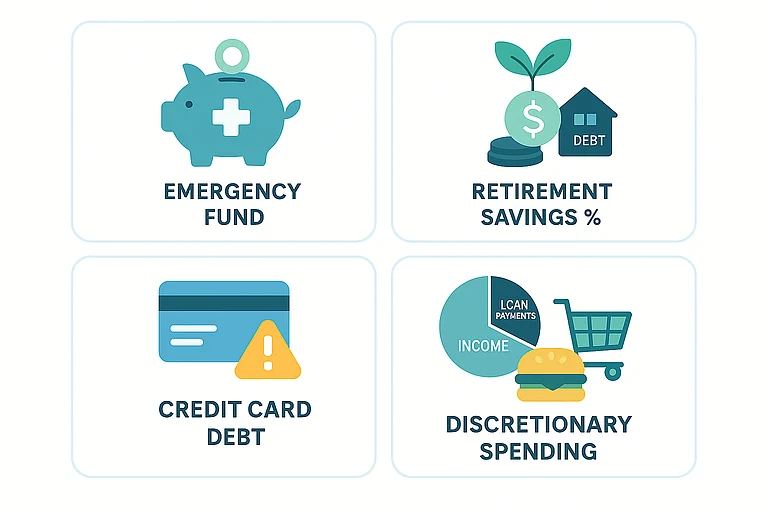By Suresh Sadagopan
We all pride ourselves on being rational and mindful when we make decisions. However, many decisions we make are emotional and even confounding.
Many times, we have certain behaviours ingrained into us. Such influences come from childhood onwards and we form beliefs that guide and even control us throughout our lives.
Childhood imprinting
This is observable very prominently in personal finance area. The messages we have received during our growing up years can influence us throughout life. These are called Money Scripts.
Money script is like an operating system that influences and even controls the financial aspects of our lives. Money scripts can be helpful sometimes and can be harmful at other times.
Money scripts - the four categories
Money scripts tend to fall into four general categories. We tend to primarily fall in one dominant category and to a lesser extent into other categories. Let us see what these categories are…
1. Money Avoidance – Some people tend to believe that money may be inherently bad, rich have acquired money by illicit means, amassing money and building wealth is not what good people do.
Such deep-rooted beliefs are ingrained in people due to the messages they have received from childhood onwards. There are many conscious and unconscious messages like “Money is the root cause of all evil”, “Money corrupts”, “You get rich mostly by unfair means” etc. Such messages remain in the background and guide people throughout their life.
Prabhat is a consultant and charges by the hour. He is an expert in his job and clients regard him well. Yet, he charges far less for this services than the going rates! Even his clients tell him that he is undercharging. Yet the sublime message that is embedded in his consciousness – Money is evil – does not allow him to charge more and he has ended up with a subsistence-level existence.
2. Money worship – Here, people have a strong belief that money offers a solution for everything in the world. They believe that happiness and security comes through money. Hence, such people pursue money relentlessly, to the exclusion of most other things.
People who are money worshippers have heard messages like “Money makes the world go round”, “Money talks”, “Money is God” etc. They may also have had experiences in life where money or the lack of it played a central role.
Radha was born in a household that experienced grinding poverty and faced many privations. They faced ostracism and ridicule at various points due to lack of money. Radha has come up through the dint of hard work and is earning well. Still she is not able to save much. She spends all her money acquiring things and other trappings. She has got obsessed with making money and spending it, that she lives pay-cheque to pay-cheque.
3. Money Status - Some people measure their worth by how much money they or others have. For them financial success is very important and is directly proportional to self-worth itself.
Since their worth is determined by financial success, they want the world to notice their success. This results in conspicuous consumption ( luxury cars, holidays, parties, etc. ), investments that spell status ( like farm houses, homes abroad, etc. ), actions that subtly signal their arrival like children’s education in “international” schools, education abroad, etc.
Premchand is a successful businessman. He had done well for himself and his family has been in the lap of luxury for a long time. However, his business has fallen on bad days. His land, homes, factories etc. were mortgaged and profits had dried up. Prem has not told his family about this. To keep up appearances, the extravagant spending, vacations and parties have been on, like always, though they were sinking in debt. Prem is worried sick – but is not able to take the drastic steps needed at this point.
4. Money Vigilance – Those who have this kind of a script may be quite cautious in their approach with money. Such people have heard messages like “We need to save for a rainy day”, “Money does not grow on trees”, etc. It can also be a factor of one’s experiences along the way.
Such people may be frugal and remain so even after they are wealthy! This is due to their anxiety about financial security they crave. They tend to be secretive and cautious about discussing money with others.
Pranita is financially secure; yet she does not spend much. Her financial advisor has already assured her about her future financial security and that she can afford to spend money on herself, on vacations, on doing up her home etc. While she is happy to hear this, she still does not spend!
The Money beliefs are mostly rooted in childhood experiences and the messages one has heard along the way from authoritative figures ( Parents, siblings, teachers, etc.)
They are formed due to –
Modelling behaviour – Watching parents or others – how they spend, save and interact with money
Emotional events – Job loss, eviction from home, divorce or even positive events like marriage, childbirth, sudden windfall, etc.
Messages – We tend to remember some messages we have heard that stays with us - “We can’t afford that”, “Rich people are selfish” etc.
Reward or punishment – If money was used as a reward, bribe or punishment, it may be seen a tool of power or control
These tend to be internalised and stay with us without we even realising it. We need to understand which money scripts we have internalised, what effect they are having on us, how they are making us feel and act, etc.
Once we identify unhelpful beliefs, we can set about catching ourselves acting those money scripts.
Reflect. Challenge limiting beliefs. Form newer habits intentionally. If all this seems too hard, there are Financial Therapists who can help.
Who said managing money is easy… If anything, it is one of the toughest! It also has the most impact in our lives. We need to pay attention and get our relationship with money right.
The author is the MD & Principal Officer at Ladder7 Wealth Planners and the author of the book “If God Was Your Financial Planner”.
(Disclaimer: Views expressed are the author's own, and Outlook Money does not necessarily subscribe to them. Outlook Money shall not be responsible for any damage caused to any person/organisation directly or indirectly.)











